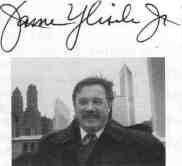 |
Home | Search | Browse | About IPO |
Staff |
Links |
|
A VIEW FROM CHICAGO
There's something rotten by James Ylisela Jr. The Police Department, that most essential underpinning of the social infrastructure, is nothing short of a mess. It's summertime and Chicago has never looked better. People are working and business is thriving. Everywhere the city appears to be remaking itself. Even the Cubs are inspiring optimism. As you drive into town, the skyline sparkles. If ever there was an advertisement for the joys of urban living, Chicago in the summer of '98 is the ultimate 30-second spot. But look again. Just beyond the gleaming lakefront, on the other side of those endless rows of fancy town- homes with their wrought iron fencing, there's something rotten. The Chicago Police Department, that most essential underpinning of the city's social infrastructure, is nothing short of a mess. Chicago's Finest have been making news all year — and for all the wrong reasons. The politicians like to remind us that crime is down across the board, but they leave out the one statistic heading in the wrong direction: crimes committed by cops. Police officers are shaking down drug dealers and running their own theft rings. Some have been suspended or face outright dismissal, accused of beating citizens during arrests and pounding confessions out of those already in custody. The Fraternal Order of Police, which represents rank-and-file officers, says Mayor Richard M. Daley has abandoned the department for political expediency. The union is already fighting a plan to boost the department's minority ranks through merit promotions, and its leaders are threatening political action of their own if Daley doesn't back off. And to think Hizzoner used to worry about the lakefront liberals. The city's police problems took center stage last November, when Superintendent Matt Rodriguez announced his "retirement" after a series of blunders left him twisting in the wind. Rodriguez alienated the rank-and-file when he decided to terminate Officer James Mullen, who had been shot in the line of duty and left paralyzed but still wanted to serve in some capacity. Two other officers who died while off duty were denied full pension benefits because their deaths occurred under questionable circumstances. Then there is Jeremiah Mearday, the young black teenager who charged that police had beaten him during a routine questioning on the West Side. Rodriguez suspended the two officers and the union responded by giving him a vote of no confidence. White uniformed officers protested the decision, and dozens showed up at Mearday's police board hearing to stare the young man down. But Rodriguez' grip on power really began to unravel after disclosures that he may have told his longtime friend, Chicago businessman Frank Milito, that he was being investigated by the FBI for an unsolved murder. The day after that story broke, Rodriguez resigned. Promising reform, Daley launched a "national search" for a new superintendent, but nobody really believed the mayor would look beyond the city limits for his next chief. And true to form, he chose Terry Hillard, a cop's cop who could mend fences with the rank-and-file and not embarrass a mayor heading into an election year. As for the department's other problems, Daley continues to pin most of his hopes for reform on one of his favorite urban policies: community policing. This was to be the kinder and gentler Chicago PD, with officers and citizens working together to solve neighborhood problems, from abandoned cars to vicious gangs. To some degree, community policing is working, particularly in areas with strong citizen organizations. But it has been less effective in some poor and minority neighborhoods, where citizens and police have historically suspected each other of bad intentions. And many cops remain convinced community policing is nothing more than political window dressing. When it comes to corruption and police brutality, they're probably right. Public relations won't catch bad guys, whether they're on the street or in uniform. And community policing won't inhibit officers predisposed to using excessive force, or magically bring racial tolerance and diversity to the ranks. These problems threaten to tarnish Daley's shiny new city. Sooner or later, the paint begins to peel, exposing all the problems that lie hidden underneath. James Ylisela Jr. teaches urban reporting at Northwestern University's Medill School of Journalism. He's the consulting editor of The Chicago Reporter. Illinois Issues June 1998 / 37 |
|
Sam S. Manivong, Illinois Periodicals Online Coordinator |
